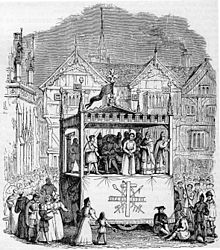- Chester Mystery Plays
-
The Chester Mystery Plays is a cycle of mystery plays dating back to at least the early part of the 15th century.
A record of 1422 shows that the plays took place at the feast of Corpus Christi and this appears to have continued until 1521. Plays on Corpus Christi Day in 1475 included 'The trial and flagellation of Christ' and 'The Crucifixion'. The plays were then expanded into a three day cycle on Whit Monday, Tuesday and Wednesday. In the years between the plays there was the Chester Midsummer Watch Parade instead.
The plays are based on biblical texts, from creation to the Last Judgement. They were enacted by common guildsmen and craftsmen on mounted stages that were moved around the city streets, with each company or guild performing one play.
Prior to the event the Crier read out these banns: "The Aldermen and stewards of evrie societie and Companie draw youselves to your said severall companies according to Ancient Customme and soe to appear with your said severall Companies everie man as you are Called upon paine that shall fall thereon". Such early banns exhorted each company to perform well.
Under Queen Elizabeth I the plays were seen as 'Popery' and banned by the English Church. Despite this a play cycle was performed in 1568 and the cathedral paid for the stage and beer as in 1562. They were performed again, over four days, in 1575. This resulted in the mayor, when he retired from his office, being taken to the Star Chamber in London to answer allegations against him, but with the support of the council (or assembly) he was freed.
The plays have been revived in modern times, and are presented in the city of Chester, England, every five years. The 2008 run of plays officially began on 28 June, and run nightly until 19 July.
The most well-known of the Chester plays relates the story of Noah and the Great Flood, traditionally acted by the Drawers of Dee (watercarriers). In it, Noah and his sons load up the provisions and the animals while his wife gossips with the neighbours. Noah urges her to hurry aboard, "The flood comes in fleeting fast; On every side it speadeth full fare; For fear of drowning I am agast; Good gossip, let us draw near". But Noah's wife keeps on drinking and gossipping until, eventually, the sons carry her onto the ark by force. At the end of the play, God provides a rainbow as a token that mankind has had enough punishment for its sinful deeds.
In the 20th century, the Noah's Flood play was set operatically by both Benjamin Britten (Noye's Fludde) and Igor Stravinsky (The Flood).
The Mysteries is an adaption by the poet Tony Harrison, principally based upon the Wakefield Cycle, but incorporating scenes from the York, Chester and N-Town canons, first performed in 1977 at the National Theatre, and again revived in 2000 as a celebration of the millennium.
See also
External links
- The Official Chester Mystery Plays Website - the website of the Chester Mystery Cycle with news of the performance in June 2008.
- Chester Mystery Plays in London - information about how to book tickets for the 2008 November performance of scenes from the Chester Mystery Plays performed by the Players of St Peter in London
- Chester Mystery Plays 2003 performance - free downloadable media clips from the Chester Mystery Cycle performance of 2003, featuring full mp3 audio track 'Christ Theme' and video excerpt from the performance.
- The original text
Further reading
- Gordon Emery - Curious Chester (2005) ISBN 1-872265-94-4
Categories:- Middle English literature
- Folk plays
- English plays
- 15th-century plays
- Festivals in England
- Chester
- Medieval drama
- Christian fiction and allegory
Wikimedia Foundation. 2010.

